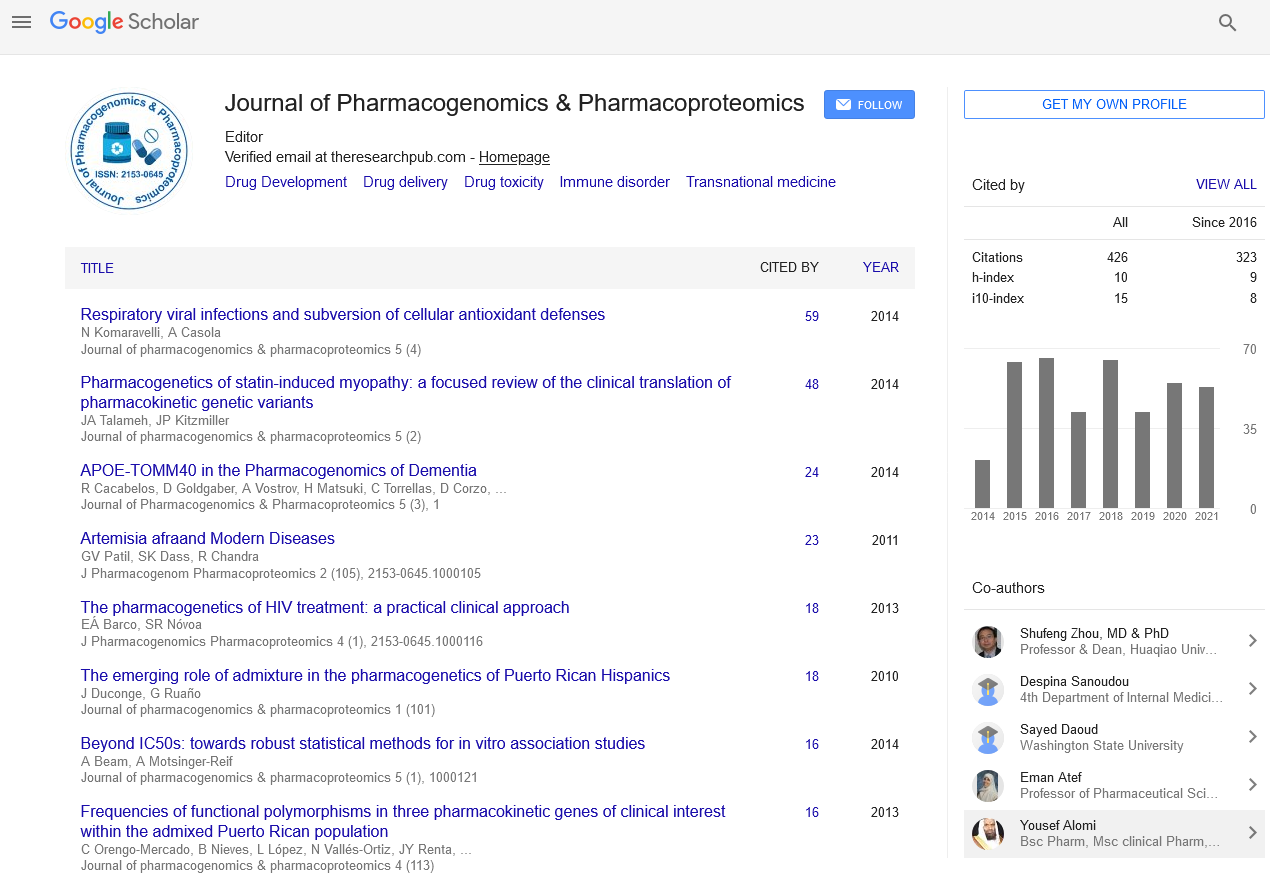Indexed In
- Open J Gate
- Genamics JournalSeek
- Academic Keys
- JournalTOCs
- ResearchBible
- Electronic Journals Library
- RefSeek
- Hamdard University
- EBSCO A-Z
- OCLC- WorldCat
- Proquest Summons
- SWB online catalog
- Virtual Library of Biology (vifabio)
- Publons
- MIAR
- Euro Pub
- Google Scholar
Useful Links
Share This Page
Journal Flyer

Open Access Journals
- Agri and Aquaculture
- Biochemistry
- Bioinformatics & Systems Biology
- Business & Management
- Chemistry
- Clinical Sciences
- Engineering
- Food & Nutrition
- General Science
- Genetics & Molecular Biology
- Immunology & Microbiology
- Medical Sciences
- Neuroscience & Psychology
- Nursing & Health Care
- Pharmaceutical Sciences
Osteoprotegrin (OPG) - receptor activator of NF-KB (RANK) - RANK ligand (RANKL) signaling system components and pro-inflammatory cytokins in blood serum of patients with primary bone neoplasms
3rd International Conference on Predictive, Preventive and Personalized Medicine & Molecular Diagnostics
September 01-03, 2015 Valencia, Spain
Nikolay Kushlinskii, E S Gershtein, Yu S Timofeev, I V Babkina, E A Korotkova, O I Kostyleva, A A Zuev, I V Boulitcheva and Yu N Soloviev
N.N. Blokhin Russian Cancer Research Center, Russia
Posters-Accepted Abstracts: J Pharmacogenomics Pharmacoproteomics
Abstract:
OPG/RANK/RANKL ligand-receptor system directly regulates osteoclast differentiation and osteolysisis. It modulates cancer cell migration controlling bone metastases development. Less is known about its role in primary bone neoplasms, though anti- RANKL antibodies have been already successfully used as targeted therapy of some bone tumors. The aim of this study was to measure OPG/RANK/RANKL and some pro-inflammatory molecules�?? in blood serum of primary bone tumor patients for assessment of their associations with key tumor characteristics and possible diagnostic, prognostic or predictive value. 163 primary bone tumor patients (37 osteosarcoma, 41 chondrosarcoma, 12 chordoma, 7 Ewing sarcoma, 2 pleomorhic undifferentiated sarcoma, 2 fibrosarcoma; 30 benign and 32 borderline giant cell bone tumor - GCBT) were involved. Control group comprised 71 persons. OPG, sRANKL, sRANK, IL-6, 8, 16, and Receptor for Advanced Glycation End product (sRAGE) serum levels were measured by standard ELISA kits. The highest sRANKL, OPG and IL-6 levels were revealed in GCBT patients, while serum sRANK, IL-8 and IL-16 did not differ between groups. IL-6 was also significantly increased in patients with benign and malignant tumors as compared to control, and sRAGE was decreased in malignant and borderline bone tumor patients as compared to those with benign tumors and control. Thus, RANK/RANKL/OPG and IL-6 serum levels in GCBT characterized by active bone destruction are markedly increased as compared not only to control and benign bone tumor patients, but also to those with bone sarcomas. Hence, these proteins can be regarded as promising serologic markers and therapeutic targets in this rare disease.
Biography :
Nikolay Kushlinskii, Corresponding Member of the Russian Academy of Sciences is the Head of the Laboratory of Clinical Biochemistry of the N.N. Blokhin Russian Cancer Research Center in Moscow. The laboratory headed by him performs a broad spectrum of classical biochemical and endocrinological analyses, as well as such specific modern tests as steroid and growth factor receptors, cytokines, angiogenic factors, bone remodeling markers, etc. He is an author of several books and more than 400 papers in refereed journals.
Email: esgershtein@gmail.com


